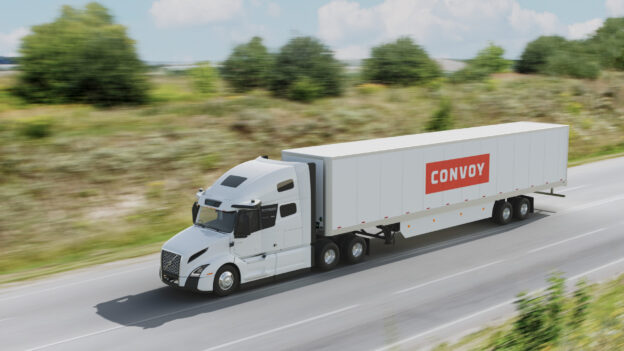Convoy Headlines FreightWaves Net-Zero Carbon Summit Event on Earth Day
Sustainability • Published on April 22, 2022
In honor of Earth Day, FreightWaves hosted their 2nd annual Net-Zero Carbon Summit virtual event. The event consisted of over 16 industry leaders and government officials speaking on the importance of sustainability in the freight industry. Convoy’s very own co-founder and CEO, Dan Lewis, spoke alongside Joy Tuffield, Partner at Generation Investment Management which focuses on investing in sustainable solutions, for the keynote discussion.
The problem of empty miles and driver utilization
Over 35% of all miles driven by truck drivers on an annual basis are driven empty. These empty miles produce over 87 million metric tons of CO2-equivalent emissions into the earth’s atmosphere on an annual basis.
“There’s an incredible cost that comes with empty miles and extra time sitting around letting [trucks] burn fuel. With this case, that adds cost to our customers. So one of the most direct ways to get our customers to appreciate and understand the impact [of empty miles] is by associating it to the cost to their business,” said Dan Lewis.
Dan went on to discuss the importance of sustainability for carriers as well. “Not only is it a financial cost for the extra miles driven and the additional fuel being burned, it’s also a cost on the drivers. Trucking is not the most sustainable profession…. If we can make [the profession] more efficient and we can help [truck drivers] be more productive and earn more per mile being driven, then they can have a more sustainable career and the industry can be more sustainable and attract more drivers.”
The misconception of ESG investing and underperformance
Convoy is not alone on its journey to make supply chains more sustainable. As of 2022, a vast majority of Fortune 500 shippers produce sustainability reports. One of the goals of these reports is to help companies be more transparent with stakeholders and investors when it comes to ESG topics.
It’s a common misconception in business and investing that companies who focus on sustainable solutions and products are less profitable and less successful. Joy, speaking on behalf of Generation, thinks that in today’s world, this couldn’t be farther from the truth. In the discussion Joy spoke about Generation’s viewpoint that the economy over the coming years will experience “a significant shift, which we like to refer to as the sustainability revolution.” Generation believes that this revolution is going to have the “scale of the industrial revolution” with the “speed of the technology revolution as ideas are so much quicker to proliferate in today’s age.”
When it comes to the supply chain industry and shippers making pledges to become net-zero by 2040, the largest contributor to many of these companies’ carbon footprints sits within their own supply chains. “[Generation] has always been looking out for companies who are providing solutions today, where the product is better, faster, cheaper, and fundamentally a better value proposition and yet at the same time was doing all of that in a much more sustainable way,” said Joy.
“Convoy really neatly sits in that bucket, where the solution they’re offering is equivalent, if not better, to other options available on the market today.” Joy continued on to mention that this was one of the key reasons Generation invested in Convoy back in 2019.
Partnership with a purpose
“There’s actually a lot of opportunities in the supply chain industry for collaboration,” said Dan Lewis. Dan went on to reference the recent announcement of Convoy for Brokers which allows other freight brokers and 3PLs to put their loads into the Convoy network providing more loads and convenience to drivers in the network.
An example of how this collaboration can create efficiencies in freight transportation can be seen from the following example shared by Dan: “We send a driver from Seattle to Sacramento. They show up to Sacramento and are looking for a job to get back to Seattle. It may be that Convoy in our own 1st party network doesn’t have a job to get the driver back to Seattle. But if we open up our platform for others to put their loads into our platform as well taking advantage of our technology, then those loads become available to all of these tens of thousands of drivers using the Convoy app, they can then maybe find a job that is really convenient to get back to Seattle through another’s brokers network. Then together we are actually able to reduce waste because that driver was able to find a more effective way to find a job and doesn’t have to drive back empty.”
This is one of many examples Dan shared in regards to collaborative programs Convoy is running with both capacity providers and shippers to produce efficiencies in the supply chain while also reducing waste.
Many competitors have approached the Convoy team about Convoy for Brokers, asking why Convoy would open up their network to other Brokers and 3PLs. “We talk about it from the lens of the carriers. These truck drivers are simply trying to keep their trucks full and that’s our priority,” said Dan. Not only does this help brokers secure efficient capacity, many times it also helps them cover loads at a cheaper cost, while also having the potential to reduce wasted emissions.
An outlook for the future
What does the next 5-10 years look like in terms of sustainable solutions and progress made towards decarbonization? In Joy’s response to this topic, she brings up the fact that technology exists today that can make a material impact on decarbonization and reducing emissions in supply chains, and that this is not something that companies should wait for another 5-10 years to implement, nor can they afford to do so if they want to hit net-zero targets.
Dan notes the massive impact electric vehicles and hydrogen fuel vehicles could have on reducing emissions in the supply chain, however, the mass adoption of these technologies are still years away.
Dan believes that data and data sharing is the immediate key to sustainable supply chains. Through data, “you can tell stories and you can show that data to the participants in the industry and influence their decisions and their behavior and prove to them that there are cost savings and prove to them that there are efficiency savings. You can get them excited about having something to go back and show to their leadership and the sustainability groups they are a part of” that can make a real material impact.
Sustainability at Convoy
We are focused on reducing the billions of waste in trucking and supporting the communities where we live and work. Learn more about Convoy’s commitment to sustainability.



